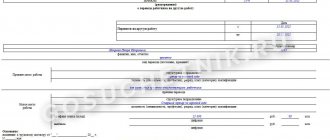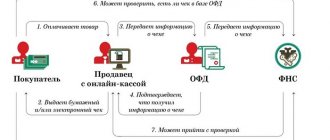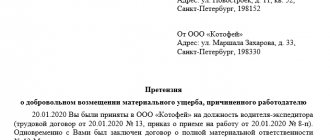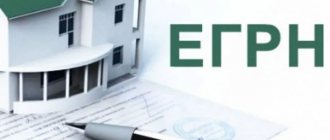A sample statement of claim for the recovery of sums of money by way of recourse, taking into account the latest changes in legislation. Recourse is a demand for recovery by the person who made the payment against another person through whose fault the losses arose.
Regression occurs for various reasons. For example, when several persons jointly caused harm, and one of them compensated the victim for the harm caused. In this case, he has the right to claim by way of recourse against other tortfeasors. Another common case: the guarantor paid the debt under the loan agreement for the borrower. And, of course, he has the right of recourse against the borrower.
Insurance companies often make claims for recovery by way of recourse under compulsory motor liability insurance, as well as from labor relations. By way of recourse, it is possible to recover, for example, rent from other owners or family members of the tenant of the premises.
In general, the claim for recovery by way of recourse is not distinguished by any special features. The plaintiff draws up and files such a claim according to the general rules of jurisdiction. The price of the claim is determined by the magistrate court not exceeding 50,000 rubles, for claims for the protection of consumer rights - 100,000 rubles) or the district (over 50,000 rubles) - to the magistrates, above - to the district (city) court.
The cost of the claim is the amount of money recovered. The statement of claim is submitted to the court at the place of residence of the defendant. The state duty is paid based on the value of the claim. The sample below will help you file a claim efficiently and competently.
In __________________________ (name of the court) Plaintiff: ______________________ (full name, address of residence,
telephone, e-mail) Respondent: ___________________ (full full name, residential address,
if known: date and place of birth,
place of work, identifier - SNILS,
TIN, series and passport number,
driver's license, vehicle license,
telephone, e-mail) Cost of the claim: ___________________ (the entire amount of the claims)
What does regression mean?
There are always at least three sides:
- The person who has the right to demand payment can be an organization (for example, an insurance company);
- The person who was obliged to pay and did not pay;
- A person who is not a debtor, but through the fault of the debtor has paid the debt for certain reasons, has a right of recourse from the moment of payment.
A clear example of a procedure that allows you to “return what you paid” are the following situations:
1. The employer brings a claim against his employee, for whom he paid damages to other persons.
Example No. 1 . During the construction of the house, one of the builders working under a contract with Semenov K.A. violated labor protection and safety requirements, as a result of which a poorly secured beam fell on the designer, who came to the site to adjust the plan, causing bodily harm. Semenov K.A. had to pay the victim compensation in the amount of 120,000 rubles according to a court decision. Subsequently, by way of recourse, Semenov K.A. recovered this amount from the employee responsible for the incident.
2. The insurance company recovers what was paid from the insured person. Here it is necessary to distinguish between the terms recourse and subrogation.
So, if the victim of an accident contacts his insurance company, there is a subsequent recovery on behalf of this organization from the company of the culprit of the accident - this is subrogation.
A claim is considered recourse when an insurance company recovers what it has paid under compulsory motor liability insurance from its client. The grounds for filing claims in this manner are provided by law:
- When the policyholder was driving while intoxicated.
- When an accident is caused by a person who does not have a driver's license.
- When the driver was not included in the insurance.
- If the driver fled the scene of the accident.
3. Recourse is allowed in the field of social insurance when compensating for damage caused by the actions of a third party.
Example No. 2 . Yakovlev A.P. was a victim in a criminal case - he was stabbed by K.R. Mironov, who was prosecuted under Art. 111 of the Criminal Code of the Russian Federation. Yakovlev A.P. He had to be treated in a hospital; he underwent two complex operations. Medical care was provided free of charge under the policy; in such cases, financing is provided from the Compulsory Health Insurance Fund (MHIF). Since the harm to Yakovlev was caused by the fault of another person, on behalf of the Compulsory Medical Insurance Fund a claim was filed against Mironov for the recovery of funds in the amount of 12,087 rubles (the cost of treatment) by way of recourse. The claim was granted by the court, as stated directly in the verdict of guilty.
4. the owner of a source of increased danger paid for the damage caused by the person who operated it. The source of increased danger includes not only vehicles, but also various mechanisms, explosives, construction equipment, etc. Article 1079 of the Civil Code of the Russian Federation reflects the obligation of the owner of a source of increased danger to bear the burden of responsibility for harm caused by him to other persons. At the same time, the owner has the right to make recourse claims for the return of what was paid from the actual culprit.
Example No. 3 . Activities of Makarov A.R. was associated with renting out his own crane - this was his good income, on which, in fact, he existed. The tenant Ivanushkin R.G., who regularly paid him the monthly rent, was himself driving the crane. Due to inexperience, Ivanushkin R.G. lost control and caused bodily harm to a stranger who happened to be near a construction site. Makarov A.R., by virtue of Art. 1079 of the Civil Code, the victim had to pay compensation for the damage caused, determined by the court in the amount of 120,000 rubles. Subsequently Makarov A.R. went to court by way of recourse, collecting from Ivanushkin R.G. the specified amount.
An approximate list of the grounds on which the recourse procedure for considering claims set out above is possible follows from Art. 1081 of the Civil Code of the Russian Federation. In fact, within the framework of this rule, it is possible to “return back” everything that was paid by a person who was not the real debtor for almost any obligation due to harm.
There are other norms of the Civil Code of the Russian Federation that regulate special cases of recourse - for example, Art. 147 of the Civil Code of the Russian Federation (in the area of securities obligations), Art. 379 of the Civil Code of the Russian Federation (on a paid bank guarantee), Art. 399 of the Civil Code of the Russian Federation (in case of subsidiary liability), etc.
So, in accordance with Art. 325 of the Civil Code of the Russian Federation, in case of joint liability, the debtor who has paid the entire amount of the debt has the right to recover it minus his part from other debtors. This situation may arise when one of the co-owners of a residential premises has paid for utilities - he can apply to the court to collect the paid debt by way of recourse from the other co-owners.
Example No. 4 .
The three apartment owners lived together and used utilities, but did not pay for them. Since a notice of water and electricity shutoff was received by mail, one of the residents decided to pay the entire amount of debt that had accumulated over 8 months. Subsequently, the tenant, who paid off the debt, collected 2/3 of the amount from the other two co-owners in equal shares (the calculation was based on their total amount of debt, divided in equal parts by three).
Legislation
All grounds for filing a recourse claim are written down in Article 1081 of the Civil Code of the Russian Federation . This article indicates all the reasons when money paid can be returned by a person who is not actually guilty of causing harm.
Also, special cases are regulated by other articles of the Civil Code, if the claim concerns obligations under securities - Art. 147, bank guarantees – Art. 379, questions regarding subsidies - Article 399. And Article 325 of the Civil Code of the Russian Federation regulates the filing of a claim by a person who has paid the entire amount of the debt that several persons had to pay. In this case, he has the right to recover the entire amount minus his share from other debtors.
Legal relations similar to recourse
One of the common examples of claims that are similar to recourse, but in the legal sense are not related to it, is the claim of the guarantor to recover the amount he paid for the borrower. Now, given the high percentage of Russians with debt, people have begun to more often refuse requests to become a guarantor for loans, whereas previously almost every second loan was secured by a guarantee.
Example No. 5 . According to the loan agreement, Kinetin R.P. was the borrower, and Suknov A.V. - guarantor. After two years of timely payments, Kinetin R.P. I stopped depositing money into the account for personal reasons, the essence of which we will not go into. Then the work of employees of the bank’s bad debt department began, and then with third-party collectors. As a result, Kinetin R.P. never even paid the current debt, and a written claim demanding repayment of the entire amount of the debt was sent to the guarantor. Suknov A.V. and I myself tried to talk to my friend, whom I had once agreed to help, but I did not achieve a positive effect. The debt continued to grow, fines and penalties grew. The bank announced its intention to recover the entire amount from the borrower and guarantor in equal shares. To prevent this from happening (Suknov A.V., first of all, was afraid of the arrest of accounts, since he was an individual entrepreneur and then all his activities would simply cease), the guarantor repaid the debt in full. From that moment on, he had the right to recourse. Suknov A.V. filed a lawsuit to recover from the borrower the entire amount of debt paid for him, a court decision was made in favor of the guarantor.
Thus, the guarantor returned back what he had paid, but since these requirements became possible within the framework of Art. 365 of the Civil Code, according to which the guarantor actually “takes” the place of the creditor, even taking advantage of the right of pledge if it exists, then it would be legally correct not to classify this situation as regressive. This is directly stated by the Supreme Arbitration Court of the Russian Federation in the Resolution of the Plenum on surety issues No. 42 dated July 12, 2012 (clauses 13-14).
Note that in a number of cases the right of recourse is excluded by law:
- If parents have compensated for the harm caused by their children, they do not have the right to demand that the minors return what they paid.
Example No. 6 . 13-year-old Nikonov P.A. caused bodily injury to the minor Egorov K.A., as a result of which the parents of the victim filed a claim for compensation for moral damage and compensation for damage to health against the father of Nikonov P.A., in the amount of 30,000 rubles. The claim was satisfied, since instead of minor children, the defendants are parents, as follows from the rules of Art. 1073 of the Civil Code of the Russian Federation. When Nikonov P.A. reached the age of majority, his father, who was in a long-term hostile relationship with his son and ex-wife, decided to file a lawsuit for the return of the amount he had paid, and named his child as the defendant. The court decision rejected these claims, since in this case recourse is not applicable. - If the harm caused by the incompetent person was compensated by the guardian, then he does not have the right to make recourse claims against the incompetent person.
How to deal with the culprits
In the event of an accident, the insurer examines the circumstances of the accident and finds out whether its client’s illegal actions were among its causes. If any, the company must prepare documents that will justify the amount of damage it has suffered and submit a claim to the insured person.
In such a situation, it is better not to try to evade responsibility. You must carefully read all documents. If the demands are fair, and the damages assessed correspond to those indicated in the protocol, then it is better to try to resolve the issue peacefully.
If the insurance company overestimates the amount of the claim, you must request copies of all documents and contact an independent appraiser. All disagreements are settled, as a rule, in court.
Useless disputes
Often clients refuse to pay under regression, citing the fact that they do not admit their guilt. This will not help you avoid payments. If the court establishes the fact of guilt during the proceedings regarding the accident, then it is not necessary to do this separately when submitting recourse claims.
If you have nothing to pay
There is a way out of any situation. One of them is an agreement with the insurance company, according to which compensation for a recourse claim can be paid in installments.
Another method is litigation. The insurer goes to court, and the court makes a decision to recover damages. After it comes into force, a writ of execution is issued, according to which the debt is automatically reimbursed from part of the debtor’s official income.
Statute of limitations
As you know, the general statute of limitations for debt collection cases is 3 years, unless otherwise specified in the contract. For recourse claims, this three-year period begins from the day the main obligation is fulfilled - then the right to “demand back” arises.
Example No. 7 . Individual entrepreneur P.D. Morozov, who organized the installation of suspended ceilings using hired workers, paid for the damage caused by the explosion of gas equipment used in the installation of ceiling canopies. Compensation was paid on November 2, 2016 in the amount of 300,000 rubles. Since in this case there are grounds for recourse claims arising as a result of payment for damage caused by the employee, Morozov P.D. filed a lawsuit for recovery from the workers of V.U. Semenov. and Polyakova P.M. the amount paid in equal shares, the court decision satisfied these requirements in full. At the same time, the court rejected the defendants’ arguments that Morozov P.D. missed the statute of limitations: the incident itself took place on March 1, 2014, and the statement of claim was received by the court office on March 17, 2017, that is, 3 years later. The decision stated that the statute of limitations for this case starts from November 2, 2016.
Earlier we indicated that recourse must be distinguished from subrogation. However, one of the differences is the rule for determining the limitation period: the right of subrogation begins from the date of the event (for example, an accident), and not from the date of payment of the insurance premium.
If the statute of limitations for recourse claims is missed for a good reason, the plaintiff, by analogy with an ordinary claim, must prove the circumstances that were an obstacle to compliance with the three-year period.
Features of submission and consideration
After the claim is filed, the day of the first hearing is determined within 5 days, implying the pre-trial nature of the case.
The review process can take up to 2 months, so you should hurry in the event of the imminent expiration of the statute of limitations.
The claim filing process has its own characteristics:
- the claim must be submitted to a judicial authority within the statute of limitations;
- the submitted document should be drawn up in accordance with the rules of procedural law, namely: it is required to indicate the details of the persons and court authorities participating in the case, indicate precise and documented requirements;
- filing and signing of a claim can only be carried out by authorized citizens - the plaintiff or an authorized representative. If an application is submitted by an authorized representative of the plaintiff, documentary evidence of the rights of this person is required.
Notice! The process of working with a recourse claim case has few differences from working with other categories of cases:
- first, a preliminary court hearing is scheduled, during which the authenticity of the demands presented is established, and the suitability of the defendant and the person specified in the claim is determined;
- Often the court puts forward a proposal to conclude a settlement agreement. In the event of such a decision, the plaintiff loses the opportunity to re-submit an application to the judicial authority on the same grounds. If the case is considered in a general manner, the court makes an authorized decision.
What you need to know when preparing a recourse claim
In practice, pre-trial recourse to the debtor for payment of what has been paid is allowed. Of course, voluntary compensation by a party for an obligation for which a third party paid a certain amount would be the most painless way to resolve the situation. You can file the requirements as a regular claim and send them to the debtor’s address. If there is no answer or you already know for sure that no one intends to return the money you paid, you should go to court, guided by the following:
- The territorial jurisdiction of district courts is determined by the place of residence of the defendant - that is, the person for whom you paid.
- The application should be submitted to the magistrate's court if the amount of the claims does not exceed 50,000 rubles; in other cases, the citizen applies to a court of general jurisdiction.
- You need to draw up a statement of claim in three copies (for the court, for the defendant and for yourself).
- The text of the statement of claim must indicate:
- all information about the main obligation. For example, if we are talking about compensation for damage caused by an employee, then the date of the court decision on recovery, the amount determined by the court to be paid, as well as the data of the citizen to whose account the funds were sent should be reflected;
- You must indicate the date of payment; you can specify the number of the payment order, receipt, etc. in the text of the application.
- it is necessary to refer to those legal events on the basis of which the plaintiff’s obligation to bear the burden of responsibility for the debtor arose - for example, to an agreement (lease, contract, employment agreement, etc.) indicating the details, dates and substance of the document;
- date and method of payment (cash, bank transfer);
- the total amount that you are asking to recover by court decision: it includes both the amount of money directly paid for the debtor and any costs associated with this: the services of a lawyer, representative, the amount of state duty (paid according to the general rules);
- Attach to the statement of claim copies of the documents to which you refer in the claim.
- It is advisable to participate in the court hearing, either yourself or another person instead of you, by proxy.
Procedure for determining jurisdiction
The cost of the claim determines the jurisdiction for consideration of reverse claims. In the case of a price less than 50 thousand rubles, the claim goes through the consideration of a magistrate, in the case of a higher price - through a district court.
In the event of litigation between legal entities, consideration takes place in a regional arbitration court.
Attention! Our qualified lawyers will assist you free of charge and around the clock on any issues. Find out more here.
Sample statement of claim for recovery by way of recourse
In general, when drawing up a claim, you must be guided by the general requirements of civil procedural legislation. You can use an example sample of a statement of claim for recovery of damages by way of recourse. Explanations are highlighted in blue.
In the Zavodskoy District Court of the city of Ekaterinburg Plaintiff: Markov P.L., residing at the address: Ekaterinburg, st. Lenina, 12, apt. 3 Tel. 8926666777 Defendant: O.D. Peredelov, residing at: Ekaterinburg, st. Elektrozavodskaya, 34, apt. 4 (make sure that the defendant’s address is indicated correctly, since the determination of territorial jurisdiction depends on this). Cost of claim: 70,000 rubles. (the price must be equal to the amount that was paid by the plaintiff)
STATEMENT OF CLAIM in accordance with Art. 1081 Civil Code of the Russian Federation (by way of recourse)
Between me, Markov P.L. and Peredelov O.D. an employment contract dated February 12, 2016 was concluded, according to which I, Markov P.L. I am an employer as an individual entrepreneur, and Peredelov O.D. - my employee. The responsibilities of Peredelov O.D. included the start-up and commissioning of refrigeration units received in faulty condition from individuals and organizations on orders. As a result of poor quality work by Peredelova O.D. to troubleshoot the unit, received on 04/02/2016 from , harm was caused to an employee of the specified organization - master Simonova K.A.
(Here we reflected the legal relations, the nature of which explains the plaintiff’s obligation to pay the debt for P.L. Markov)
By the decision of the Zavodsky District Court of Yekaterinburg dated May 25, 2016, I, as an employer, was charged in accordance with Art. 1068 of the Civil Code of the Russian Federation, recovered 70,000 rubles as compensation for causing harm to the health of Simonova K.A. During the trial, it was proven that the harm to Simonova was caused by an employee employed in my company, P.L. Markov, since the victim, being convinced of the serviceability of the unit, began working with it. As a result, I, as an employer, was found to be a defendant. This decision entered into legal force; on July 1, 2016, I transferred it to the account of Simonova K.A.:
- 62,000 rubles as compensation for damage caused by the court;
- 6000 rubles – expenses of Simonova K.A. to file a claim, prepare materials for the court;
- 2000 rubles – state duty paid by Simonova K.A., and in total a total amount of 70,000 rubles.
In addition, I incurred additional expenses:
- 2000 rubles is the state duty paid by me.
- 2000 rubles is the cost of the services of the lawyer who drafted this claim, and in total the total amount is 4000 rubles.
It is better to indicate in detail what expenses the plaintiff incurred in fulfilling the obligation to compensate for damages for the actually guilty person.
Be sure to provide the legal provisions on the basis of which, in the plaintiff’s opinion, the claims must be satisfied.
According to Art. 1081 of the Civil Code of the Russian Federation, a person who has compensated for damage caused by another person (including an employee in the performance of work duties) has the right to claim back (recourse) against this person in the amount of compensation paid.
Based on the above, guided by Art. Art. 1081 Civil Code of the Russian Federation, 131-132 Civil Procedure Code of the Russian Federation,
ASK:
Collect by way of recourse from Peredelov O.D. in my favor 74,000 rubles, of which:
- 70,000 rubles - the amount paid by me in accordance with Art. 1068 of the Civil Code of the Russian Federation by court decision dated May 25, 2016;
- 4,000 rubles (additional costs for paying state fees and legal services).
Application to the claim:
- A copy of the statement of claim.
- Receipt for payment of state duty.
- A copy of the decision of the Zavodsky District Court of Yekaterinburg dated May 25, 2016;
- A copy of the employment contract between individual entrepreneur P.L. Markov. and Peredelov O.D. dated 02/12/2016;
- A copy of the payment order for transfer to the bank account of Simonova K.A. from the account of IP Markov P.L.
Date, signature
After the decision
Based on judicial practice, recourse claims in most cases are satisfied in full by the courts. Partial satisfaction is possible in cases where there is a dispute not about the right to reimburse the debt, but about the amount of the amount claimed by the plaintiff. Thus, in some cases, defendants do not agree with the additional expenses incurred by the plaintiff (for example, travel costs - if we are talking about the plaintiff living in another city, legal expenses for preparing documents for the court, etc.).
Example No. 8 . A hired driver hit a pedestrian, as a result of which the owner of the car paid compensation to the victim A.P. Zinovieva, the amount of which was quite significant - 500,000 rubles. The woman spent a long time in the hospital; her health was seriously harmed, resulting in the inability to move (the spine was affected). The culprit of the accident was convicted under Art. 264 of the Criminal Code of the Russian Federation, however, claims were brought against the owner of the car in accordance with Art. 1079 of the Civil Code of the Russian Federation to K.E. Nosov, who did not have the financial ability to pay the debt immediately. Nosov K.E. had to take out a loan for the specified amount - so he still paid compensation to A.P. Zinovieva. Subsequently, Nosov K.E. filed a recourse claim against the driver, and included in the amount of the claim not only the amount of money actually paid to the victim, but also the interest that he paid under the loan agreement before the date of going to court. The defendant contested the claim regarding additional expenses (that is, credit interest), indicating in his objections that he did not force K.E. Nosov. draw up a loan obligation and will not pay anything in excess of 500,000 rubles (he agreed with the main amount).
In this situation, a court decision was made to collect claims from the defendant in favor of K.E. Nosov. in full. At the same time, the practice of courts in terms of satisfying additional claims by way of recourse is ambiguous. In any case, the need for such expenses must be confirmed in court with evidence.
What to do when a court decision by way of recourse has taken place? There are no special recommendations here. The general rules of litigation apply: if you do not agree with the decision, you can appeal it within a month from the date the full text was announced; if you agree with the decision and it has entered into legal force, the writ of execution must be submitted to the Federal Bailiff Service to initiate enforcement proceedings.
Owner of a source of increased danger
Art. 1079 of the Civil Code of the Russian Federation provides for liability for damage caused by hazardous activities. As a rule, the content of this article is usually applied to legal relations related to road accidents, although in fact the scope of application of the concept of “increased danger” is much wider and includes activities related to:
- land, rail, air and water transport with means;
- high voltage electricity;
- atomic energy;
- explosive substances and poisons, etc.
Damage resulting from such activities is compensated by the owners unless they provide evidence that:
- there was an impact of irresistible force;
- the harm occurred due to the guilty actions of the victim himself;
- the source of harm was removed from the operational control of the owner at the time of causing the harm for various reasons, for example, as a result of car theft or hijacking of an aircraft.
Thus, if damage is caused as a result of an accident due to the fault of the bus driver, it will be recovered not from the driver, but from the bus fleet.









